Hallelujah
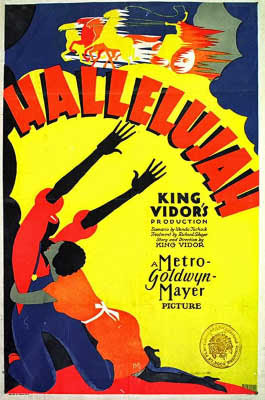
Director: King Vidor
Year: 1929
Rating: 6.0
This is a really remarkable film for a few
reasons. Race films - ie all black actors for black audiences - had been
around since 1915 but the idea of a major studio - in this case MGM - making
a film with an all-black cast was unthinkable. There were huge swathes of
America and movie theaters that would never show a film like this. Hell,
even having one black actor in a major role was often reason for some theaters
in the south not showing it - and that was in the 1960s. But King Vidor kept
pushing MGM to allow him to direct such a film and they always turned him
down. But then he directed two huge hits The Big Parade (1925) and The Crowd
(1928) and the head of the studio had to listen. Let him make his race film.
And it turned out to be both a critical and box-office success (wherever
it was allowed to play). There was really nothing like it before and perhaps
since. For its time it was very progressive and the actors and the black
organizations were thrilled for its success. Not that there was much of a
follow-up of course till Cabin in the Sky and Stormy Weather both in 1943
and then little after that for decades.
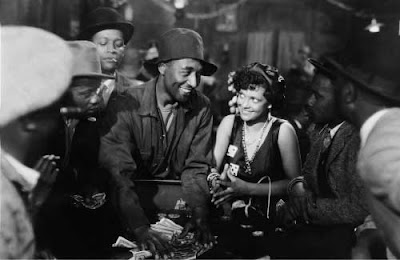
But as with everything, times have changed
our perception of it - what was progressive 90 years ago is considered by
some to be racist and full of stereotypes today. The DVD company that distributed
it put a warning up front that this was racist and it might offend people.
Because everything offends some people today. And there is some truth to
that but not in the usual way these old films often depicted blacks. There
is none of that Yes Suh No Suh dialogue, no servants, no kowtowing towards
whites (which there are none in the film), none of that bug-eyed comedy or
sloth-like behavior. None of the usual stereotypes that we come across so
often but the critics have labeled it as paternalistic (happy sharecroppers)
and stereotyping their religious fervor and their sexual animalistic needs.
They refer to the woman in the film as a "whore" - no she isn't - morally
ambiguous perhaps and certainly a con woman but not a whore. There is some
truth to their criticisms, but it feels like they are overlooking everything
else to focus on what they want to be politically correct about. The film
is really about family and one man's fight against his urgings. The family
unit here is strong and powerful and when he returns to them in the end after
going wrong, it is welcoming, loving and forgiving. Much more positive about
the black family unit than films more current. I understand that it is hard
to look at an old film without bringing your own modern sensibilities into
it - but sometimes you need to step the fuck back and say wow for its time
this was amazing - but so many have to go through the virtue signaling ritual
and lead off with it.
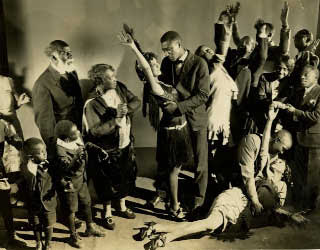
I should also mention that this is a musical.
Of sorts. Musicals were bursting onto the screen in 1929 - often very stage
bound or stilted with a few exceptions - Lubitsch - but this takes an entirely
different tack - naturalistic. It is a family sitting around the dinner table
when someone pulls out a banjo and they all join in, songs at a club of ill-repute,
religious spiritual music, singing in the cotton fields, singing in joy at
the end of a hard day's work, singing to yourself soft and low. None of it
feels phony. Even if it is a song from Stephen Foster - Down Upon the Swanee
River or Irving Berlin's Waiting at the End of the Road - it is sung in a
style that feels authentic to the black music of the time.
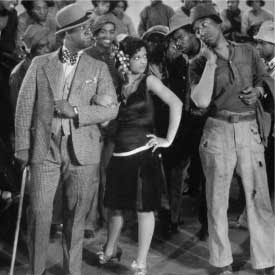
The black sharecropping family - consisting
of a mother, father, five children and a woman who has as best as I can tell
been adopted - has finished their cotton picking for the season and are sending
their produce to the cotton gins to then be shipped upriver. The oldest son
Zeke (Daniel Hayes) and his young brother Spunk (Everett McGarrity) take
it into town and get $100. Zeke sees a dice game being played but he skips
by that temptation - but not the next, a Jezabel type named Chick dancing
and enticing, looking for targets with money. Zeke falls for her faster than
lights going on - she is magic to him and when she finds out he has a $100
she sees a gold mine. She purrs and strokes him and gets him into a crooked
dice game with her partner Hot Shot (William Fontaine). He loses his money,
realizes he has been had and gets into a fight. Hot Shot pulls out a gun
and during the fight Spunk comes in and gets shot and dies.
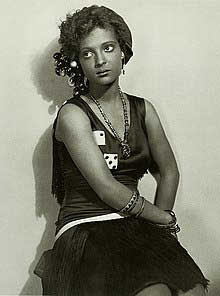
This puts him on a road of both salvation
and sin in which he becomes a popular preacher who rides into towns on a
mule with children singing but is unable to stop being tempted by Chick who
keeps showing up, The devil and the dark blue sea. There are some wonderful
scenes in the film - the hokey-pokey club full of music, women and men dancing,
smoke filling the air, desires on every face - and a few religious gatherings
are amazing - Zeke - sermonizing about the devil - doing a step that comes
close to the Moon Walk, the folks taken by the spirit. Haynes was in fact
a preacher and has a wonderful singing voice - I wonder if he ever recorded
it - deep and strong. I could listen to him sing Swing Low, Sweet Chariot
all day. When he sings the movie stops and just listens. He acted in a few
other films but show business was not his life. Unlike for the actress in
her debut who plays Chick - Nina Mae McKinney - who would go on to perform
in Europe - be called the Black Garbo - and appear in small roles in many
films - Sanders of the River being the best-known. This film wasn't what
I was expecting - with a title like Hallelujah I thought it was going to
be this joyous film with a lot of dancing and singing by blacks in some happy
wonderland. Far from it - realistic, dark and pessimistic with salvation
taking you back home to the family.
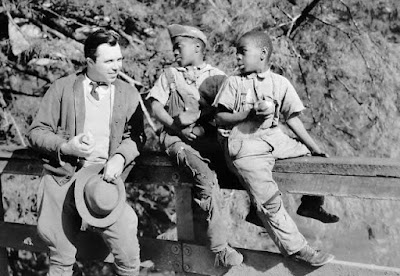 King Vidor and the Two
Young Brothers
King Vidor and the Two
Young Brothers






